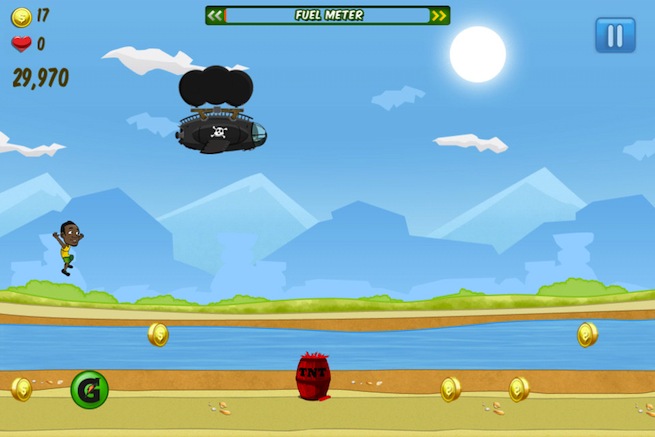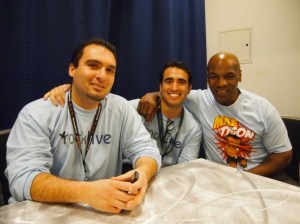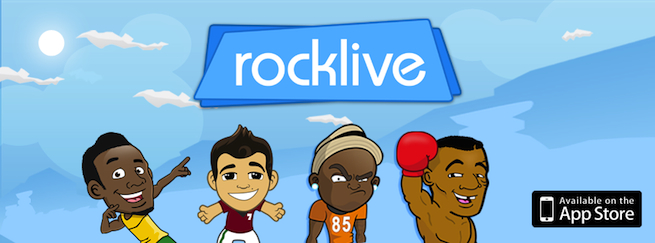
What do Chad “Ochocinco” Johnson, Mike Tyson, Cristiano Ronaldo, and Usain Bolt have in common? They’re all mega-famous, world-class athletes, of course. But they also all appear in free-to-play games by iOS developer RockLive, a five-person company that I honestly had never heard of before I did research for another article a few months ago and which has operated until last week from cofounder John Shahidi’s garage.
So, how does this happen?
 “Everyone approached us,” Shahidi said in an interview with GamesBeat. “We have never approached anyone, only because our plates have been so full. We’ve developed some contacts; there are some people we don’t have relationships with, but we know that we can make a game for them if we have a good idea. It’s just we don’t have that bandwidth.”
“Everyone approached us,” Shahidi said in an interview with GamesBeat. “We have never approached anyone, only because our plates have been so full. We’ve developed some contacts; there are some people we don’t have relationships with, but we know that we can make a game for them if we have a good idea. It’s just we don’t have that bandwidth.”
Shahidi’s answer is confusing at best because it doesn’t explain why people like Tyson or Bolt would seek out an under-the-radar developer to make games for them, and he’s not much help. He explained that he had a link to Ochocinco, star of the company’s first game (a Temple Run-style game called Mad Chad), through one of his teammates.
But regarding Tyson, who stars in RockLive’s second game, the touch-controlled Punch-Out!! clone Main Event, Shahidi said, “Honestly, I’ve never really asked Mike how he heard about us; I just remember one day getting a random e-mail from his wife, who’s his business manager, saying, ‘We’re interested in working with you guys, and we have an idea for an app. Please give us a call.’ And that’s pretty much how it happened. I never really asked, ‘How did you hear about us in the first place?’ I should, but at the time I just wanted to seal the deal.”
It’s easy to get caught up on why and how RockLive has lined up its ridiculously high-profile celebrity deals, but maybe those details are unimportant next to what it’s been doing with those affiliations: methodically building up its community from game to game. And this is how the company plans to move beyond simple, fun stunt-cast games into a full-on social distribution service.
Shahidi cofounded the company with his brother, Sam, in January 2010, and it has since produced four games: the aforementioned Mad Chad and Main Event, as well as Heads Up (a match-3 puzzler featuring Ronaldo) and its most recent release, another runner called Bolt, which released just ahead of this summer’s Olympics.
Bolt has generated over 2 million new user signups to RockLive’s in-game social platform, Shahidi says. It consistently ranks among the top 10 free games in several countries, according to game metrics site AppData, and the cofounder is quick to point out that it has done all of this without traditional public relations or marketing.

“One time, some PR firm was pitching us, and they wanted ridiculous money,” he explained. “I looked at them and I said, ‘Twitter is my PR.’ It’s organic. If someone posts about it, they really played it, and they must have really enjoyed it for them to go and tweet about it. You’re not going to tweet about a game that you’re just testing or you really hate or anything like that. Like, you really like that game if you hit that tweet button.”
With its next game, Play Blackjack, RockLive hopes to build on the community it has cultivated through its celebrity titles to establish itself as a self-contained social platform. It has some pretty ambitious ideas about how to do that, including cross-game chat, private messaging, and social media functionality beyond Heads Up’s and Bolt’s score-sharing features.
“There’s a Twitter button inside the game on the table,” Shahidi explains. “And if you click that, it’ll pull every user’s Twitter handle that’s playing the game, whether you’re friends with them or not, and it’ll tag all our Twitter accounts and say, ‘I’m playing Blackjack with these guys, come join us.’ And you can tweet that.
“Now you become friends with these people outside of the game because you tweeted about them, and they’ll see that tweet obviously, but whoever is reading your tweets, if they click that link that you just tweeted, it’ll go straight into your table. If you don’t have the game, it’ll direct you to iTunes, but if you have it, it’ll take you straight to that table and you can join them. So that’s the biggest thing that we did, to make it very social with a lot of Twitter integration built into it.”

If you’re like me, at this point you’re probably imagining your poor Twitter feed overrun with several hundred annoying entries about who’s playing blackjack, who’s really bad at blackjack, who just stopped playing blackjack, or who is thinking about blackjack. But so is Shahidi.
“We’re trying to be careful, so it’s not automatic. You decide to click that button, and when you click that button, you decide to send. I think the bad ones are the ones that are automatically posting. That’s the biggest difference, especially on Facebook. There’s a lot of automatic posting on Facebook. I hate it. Even if I like the app, I’ll delete it. Ours is voluntary, and it requires a few extra steps, so it’s gonna be hard for you to just do it over and over and over again. You only do it if you really want to do it.”
We’ll see how it goes, though. In my experience, if people can tweet something, they will, and all the good intentions in the world can’t counteract a public hellbent on sharing its every deed with the world. Regardless, I suppose the thought counts for something.
“We really want everyone to be happy and extra positive when they’re inside our games,” Shahidi said. “I don’t think we’d have over three million registered users if we were so much in your face.”
VentureBeat's mission is to be a digital town square for technical decision-makers to gain knowledge about transformative enterprise technology and transact. Learn More
